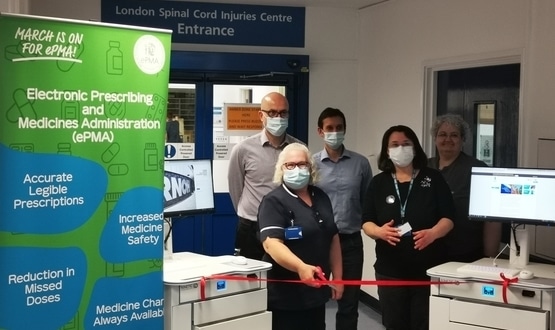Royal National Orthopaedic Hospital rolls out pilot openEPMA system
- 30 March 2022

The Royal National Orthopaedic Hospital NHS Trust (RNOH) has gone live with a pilot of an open Electronic Prescribing and Medicines Administration (openEPMA) system.
The system, which has been created by Interneuron, will replace the current paper-based system at RNOH and will mean that prescribing, medicines administration and dispensing across the trust can be delivered digitally.
Clinical members of staff will be able to administer drugs from the latest ID3 Medicine Carts and the new technology allows these to be linked with a touch screen facility as well as digi-lockable drawers ensuring the highest level of patient safety.
Staff will also have greater access to the trust’s clinical portal and the cart range will facilitate closer patient engagement whilst allowing staff to carry out their clinical/IT based duties.
openEPMA benefits
RNOH co-designed the openEPMA system alongside Interneuron, an open-source health and care software development company. The project has been delivered through close collaborative working of clinical and digital teams and will provide a host of benefits to both patients and staff at the trust.
A key positive of the switch from a paper-based system to digital is improved patient safety through a reduction in human medication errors, and improved legibility and completeness of prescriptions, decreasing the risk of errors and adverse.
Dr Lila Dinner, EPMA project executive lead and chief medical officer at RNOH, told Digital Health News: “An electronic system as opposed to a paper drug chart system is a huge step forward for patients. The primary reason to do it is an improvement in patient safety.
“You can reduce a certain amount of the inevitable human error that comes from doing medicines, prescribing and administration, because you can design some of those things in your system.”
Other benefits of an EPMA system include enhanced patient care as the time saved gives clinicians more time to spend with patients, and medication records are stored electronically and available 24/7 so time is no longer wasted searching for paper charts.
Pilot phase success
Recently, the pilot phase of the programme began at RNOH in the LSCIC and Jubilee Rehab wards, with a trust-wide deployment set to commence this summer. So far, Dr Dinner confirmed that there have been initial positive reactions during the pilot phase.
She said: “The pilot phase has gone really well so far. We’ve had nurses literally dancing around the drug trolley, so I think that’s a pretty good sign that they’re enjoying it and that it is actually having an impact on their day and their staff experience.
“This is hugely important. It’s not just that it releases time for other things, but it is a more pleasurable experience and it feels safer and nicer, which is hugely important for making you have a good day at work.”
The Interneuron impact
RNOH’s relationship with Interneuron dates back to 2019, when a deal was first signed to develop an open-source clinical data platform.
With the continued drive towards digital transformation, Interneuron has built a better alternative to the currently available solutions for RNOH. Open by design, every release and update includes a comprehensive bill of materials to document every component and library used within the solution.
In the spirit of ‘keep your options open’, Interneuron have provided free unfettered access to their software, which is available here, for people to experience it for themselves.
Joel Ratnasothy, CEO at Interneuron, said: “As far as we know this is the world’s first truly open source EPMA solution from the application though to the data platform. Not just open data, not just vendor neutral, but truly open source.
“This will be a game changer in the EPMA space, allowing a richer experience for professional prescribers and pharmacists. openEPMA integrates with the other Interneuron modules within our Modular Care Record (openMCR) or 3rd party solutions, both within the hospital and in the community.”
Advice for fellow trusts
Having played a significant role in getting this project off the ground and overseeing the development and current pilot phase, Dr Dinner says there are a few things that trusts must consider if they are looking to implement a similar system to RNOH.
She said: “From a clinical perspective you have to know your due diligence. The system has very much been designed for us and our clinical environment as a specialist hospital, so for other hospitals that’s something to absolutely consider.
“The other thing to consider is the manpower resource that’s required. A project like this requires a lot of engaged, interested and willing clinicians to take part.
“You need really good project management and really good planning in order to have a successful implementation.”





1 Comments
How can this be safe and cost effective? True open source by definition would mean everyone contributes to the code, not just re-uses it. Is this supplier underwriting its safety for others – this is a very sensitive application? What makes this hospital’s processes so unique? Surely everyone re-using this software has to write yet another supplier safety case to meet the regs prior to their own case? COTS products re-use software for cost effectiveness don’t they? And who is supporting the product long term? Open data standards – now that’s a different story and well worth supporting, but surely a developer could have produced a similar product against open data standards without having to trumpet open source as the key. There are commercial ways of re-using non open source software. And lets face it – most proprietary software has ha some open source in its depths for decades. If this is purely about commercial mechanisms I consider the balance of risk maybe loosing its way in pursuit of winning awards. No where in this article is a rock solid benefit of open source over non open source approaches mentioned.
Comments are closed.